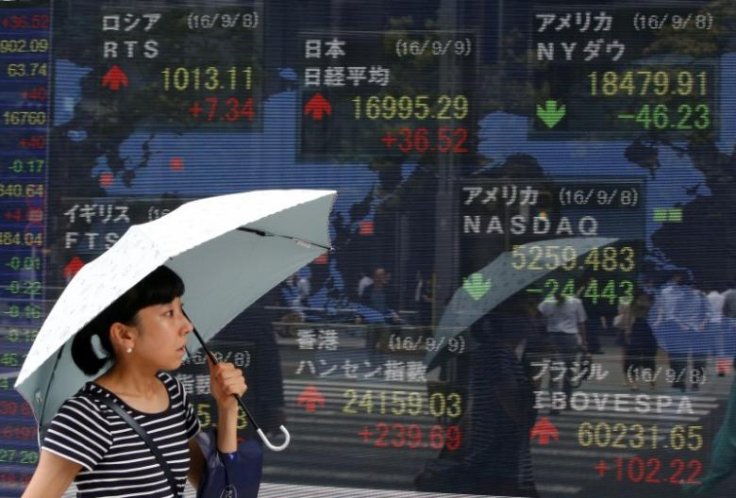
Asian stocks skidded to a one-month low on Thursday after the United States opened a new front in its trade dispute with Europe by imposing tariffs, adding to already-growing market fears about global growth.
MSCI's broadest index of Asia-Pacific shares outside Japan .MIAPJ0000PUS dropped 0.78%. Japan's Nikkei stock index .N225 fell 2.20%, on course for its biggest daily decline in six months. Australian shares slumped 2.13% to a five-week low.
U.S. stock futures were up 0.25%, but this did little to bolster sentiment after shares on Wall Street suffered their sharpest one-day decline in nearly six weeks on Wednesday, when the three major New York share indexes all lost more than 1.5%.
Yields on two-year U.S. Treasury yields fell as weakening data on manufacturing and the jobs market suggested the trade war with China has damaged the U.S. economy.
Oil futures extended their decline in Asia as a bigger-than-expected increase in U.S. crude inventories and growing evidence of slowing economic growth point to lower energy demand.
The United States and China have already hiked tariffs on each other's goods in a year-long trade row that has raised the risk of recession and caused major central banks to ease monetary policy.
On Wednesday, President Donald Trump's administration announced the United States will impose tariffs on $7.5 billion of goods from the European Union.
Washington will enact 10% tariffs on Airbus (AIR.PA) planes and 25% duties on French wine, Scotch and Irish whiskies and cheese from across the continent as punishment for illegal EU aircraft subsidies.
EU manufacturers are already facing U.S. tariffs on steel and aluminium and a threat from Trump to penalize EU cars and car parts.
The tariffs announced Wednesday were approved by the World Trade Organization but could still cause friction across the Atlantic.
The chance that Europe will respond in kind will fuel worries there could be prolonged damage to global growth.
"Tariffs could be a source of tension between the United States and the EU," said Masayuki Kichikawa, chief macro strategist at Sumitomo Mitsui Asset Management Co in Tokyo.
"The U.S. economy is finally starting to slow, because of trade friction and problems in the manufacturing sector," he said. "People in the markets want to see if this leads to weaker job growth."
The two-year yield fell to 1.4680%, approaching a two-year low of 1.4280%, after a weak U.S. private sector jobs report depressed boosted expectations that the Federal Reserve will cut interest rates this month.
Traders see a 74.9% chance the Fed will cut rates by 25 basis points to 1.75%-2.00% in October, up from 39.6% on Monday, according to CME Group's FedWatch tool.
Bets on a rate cut could rise further if U.S. non-farm payrolls due on Friday show weakness in the labor market.
Hong Kong shares .HSI fell 0.6% as anti-government demonstrators clashed with police into the early hours of Thursday, venting their anger over a policeman's shooting and wounding of a teenager.
The financial hub has been rocked by months of protests over China's rule of the former British colony.
U.S. crude rose 0.36% to $52.83 a barrel. Brent crude rose 0.1% $57.75 per barrel. In addition to a slowing global economy, energy traders are worried about an oversupplied market and the chance of geopolitical friction in the Middle East.
Spot gold, a safe-haven asset that investors often buy during time of heightened risk, rose 0.1% to $1,500.70 per ounce, but in the currency market the safe-haven yen JPY=EBS and Swiss franc CHF=EBS were little changed versus the dollar.








